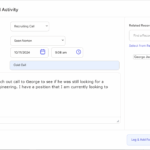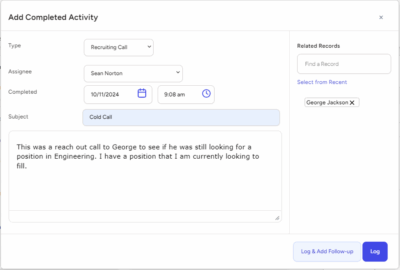Effective candidate communication is at the heart of successful recruiting. Whether you’re working with entry-level applicants or C-suite executives, how you engage with candidates throughout the recruitment process can significantly impact their experience, your agency’s reputation, and ultimately, the likelihood of making a successful placement. Unfortunately, managing candidate communication can be challenging, especially when dealing with high volumes of candidates, tight deadlines, and multiple job orders.
This is where advanced recruiting software comes into play. As technology evolves, so do the tools that recruiters can leverage to enhance communication with candidates. From automated messaging systems to candidate relationship management (CRM) tools, advanced recruiting software offers features that enable recruiters to stay organized, keep candidates engaged, and provide a more personalized experience.
In this article from Top Echelon Recruiting Software, we’ll explore how advanced recruiting software improves candidate communication, the key features that make this possible, and how recruiters can use these tools to enhance engagement, streamline the hiring process, and ultimately improve placement success.
Why Candidate Communication is Critical in Recruitment
Before diving into the ways that recruiting software can improve candidate communication, it’s essential to understand why communication is so vital to the recruitment process. Whether a candidate is actively seeking a job or passively exploring new opportunities, the way they are communicated with can make or break their decision to engage with your agency and, by extension, the client’s company.
1. Building Trust and Engagement
Candidates want to feel informed and valued throughout the hiring process. When recruiters maintain clear, consistent communication, candidates are more likely to trust the process and remain engaged, even when the hiring timeline stretches out longer than expected. Poor communication, on the other hand, can lead to frustration, disengagement, and even candidate withdrawal.
2. Creating a Positive Candidate Experience
The candidate experience is a crucial factor in recruitment success. A positive experience, even for those who do not get hired, increases the likelihood that candidates will recommend your agency to others, apply for future roles, or consider positions with your clients in the future. Effective communication helps set expectations, keeps candidates informed about their status, and ensures that they leave the process with a favorable impression of your agency and the client.
3. Reducing Drop-Off Rates
One of the most significant challenges recruiters face is candidate drop-off—when candidates disengage from the process or accept offers elsewhere. A primary cause of drop-off is poor communication, particularly when candidates feel they are left in the dark about where they stand. Regular, transparent communication helps to keep candidates engaged and reduces the risk of losing them to competing offers.
4. Improving Time-to-Fill
Good communication streamlines the recruitment process by ensuring that candidates respond promptly, attend interviews, and complete necessary paperwork on time. When candidates are well-informed, they are more likely to move quickly through the hiring stages, reducing the time-to-fill for open positions.
Given these benefits, it’s clear that improving candidate communication should be a top priority for recruiters. Fortunately, advanced recruiting software offers a range of tools that make this easier and more effective than ever before.
Key Features of Advanced Recruiting Software for Candidate Communication
Advanced recruiting software includes several key features that streamline communication with candidates, allowing recruiters to maintain engagement and deliver a personalized experience at scale. Here’s a look at the most important tools and how they improve candidate communication:
1. Automated Messaging and Email Campaigns
One of the most powerful features of modern recruiting software is the ability to automate candidate communication. Automated messaging allows recruiters to send personalized emails, text messages, or notifications at key stages of the hiring process without having to manually follow up with each candidate.
a) Application Confirmation and Updates
As soon as a candidate applies for a position, the software can automatically send a confirmation email, acknowledging receipt of the application and providing an outline of the next steps. This immediate communication reassures the candidate that their application has been received and sets expectations for what comes next.
Automated updates can also be sent at critical points in the process, such as when a candidate moves to the next stage, when their application is under review, or when an interview is scheduled. This proactive communication keeps candidates informed without recruiters having to manage every touchpoint manually.
b) Personalization at Scale
Even with automation, it’s crucial to maintain a personal touch. Advanced recruiting software allows recruiters to personalize automated messages by pulling in specific candidate data, such as their name, the role they’ve applied for, or previous interactions. This ensures that candidates feel valued and engaged, rather than receiving generic, impersonal messages.
For example, an automated message might read: “Hi [Candidate Name], thank you for applying to the [Job Title] position at [Client Company]. We’re currently reviewing your application and will get back to you shortly with next steps.”
c) Follow-Up Reminders
Recruiters can also set up automated reminders to follow up with candidates who have not responded within a certain time frame. For example, if a candidate hasn’t confirmed their interview time or submitted requested documents, the system can automatically send a gentle reminder, reducing the likelihood of delays.
By automating routine communication tasks, recruiters can stay in touch with candidates more effectively, ensuring that no candidate falls through the cracks due to missed follow-ups or manual oversights.
2. Candidate Portals and Self-Service Tools
Candidate portals are a valuable feature of advanced recruiting software that allows candidates to access important information and manage their recruitment process directly. These self-service tools empower candidates and reduce the need for constant back-and-forth communication between recruiters and candidates.
a) Access to Application Status
Candidate portals provide real-time access to the status of their application. Instead of waiting for updates from the recruiter, candidates can log into their portal to see where they stand in the process—whether their application is under review, if they’ve been selected for an interview, or if additional information is required. This transparency reduces candidate anxiety and keeps them engaged throughout the process.
b) Interview Scheduling
Many advanced recruiting platforms allow candidates to self-schedule their interviews through the portal. Candidates can choose from available time slots, reducing the time it takes to schedule interviews and eliminating the need for back-and-forth emails to confirm availability. This not only improves efficiency but also gives candidates greater control over their scheduling, improving their experience.
c) Document Management
Candidate portals also allow candidates to upload necessary documents, such as resumes, cover letters, portfolios, or references. This reduces the administrative burden on both the candidate and the recruiter, ensuring that all necessary information is submitted promptly and stored securely in the system.
Self-service tools enhance candidate communication by providing them with direct access to the information they need and allowing them to manage their application process independently. This reduces the communication load on recruiters while improving the candidate experience.
3. Multi-Channel Communication (Email, SMS, and In-App Messaging)
Today’s candidates expect communication through various channels, not just email. Advanced recruiting software allows recruiters to engage candidates through multiple channels, including email, SMS, and in-app messaging. This flexibility ensures that recruiters can reach candidates where they are most responsive.
a) Email Communication
Email remains a primary communication channel for most candidates, particularly for detailed updates such as interview instructions or job offer letters. Advanced recruiting software integrates with email platforms, allowing recruiters to send personalized, automated emails directly from the system. This ensures that all email communication is tracked and logged, making it easy to refer back to previous conversations if needed.
b) SMS and Text Messaging
Text messaging is becoming increasingly popular for candidate communication, particularly for time-sensitive updates such as interview reminders, follow-ups, or scheduling confirmations. Recruiting software allows recruiters to send SMS messages directly from the platform, ensuring that candidates receive timely updates even if they’re not checking their email regularly.
For example, an SMS might read: “Hi [Candidate Name], just a reminder about your interview for the [Job Title] position tomorrow at 2:00 PM. Please let us know if you have any questions!”
c) In-App Messaging
For candidates using the agency’s mobile app or web portal, in-app messaging provides another way to communicate. This feature allows recruiters to send direct messages to candidates through the platform, which can be particularly useful for quick updates or reminders. In-app messaging also ensures that all communication is centralized within the system, making it easier for recruiters to track conversations and respond quickly.
By offering multi-channel communication options, recruiting software ensures that candidates receive updates in the most convenient way possible, improving responsiveness and engagement.
4. Candidate Relationship Management (CRM) Tools
Building and maintaining long-term relationships with candidates is critical for recruiters, especially when dealing with passive candidates or those who may not be the right fit for a current role but could be ideal for future opportunities. Candidate relationship management (CRM) tools within advanced recruiting software help recruiters nurture these relationships over time.
a) Tracking Candidate Interactions
CRM tools allow recruiters to track every interaction with a candidate, from initial contact to follow-ups, interviews, and offers. This ensures that recruiters have a complete history of the candidate’s journey, enabling more personalized communication. For example, a recruiter can easily see if a candidate has applied for previous roles or if they expressed interest in a particular industry, allowing for more targeted outreach.
b) Nurturing Passive Candidates
For passive candidates who may not be actively seeking a new role but are open to opportunities, CRM tools enable recruiters to stay in touch without being intrusive. Recruiters can set reminders to check in with passive candidates periodically, send industry news or updates, or reach out when relevant roles become available.
By nurturing these relationships over time, recruiters can build a talent pool of engaged candidates who are more likely to respond positively when the right opportunity arises.
c) Personalized Engagement
CRM tools allow recruiters to segment their candidate database based on specific criteria, such as industry, skills, or job preferences. This enables personalized communication tailored to the candidate’s unique needs and career goals. Whether it’s sending a job alert, sharing a relevant article, or following up on a previous conversation, CRM tools help recruiters provide value to candidates even when they’re not actively recruiting for a role.
5. Analytics and Reporting for Communication Optimization
Advanced recruiting software provides analytics and reporting tools that allow recruiters to track the effectiveness of their communication efforts. These insights enable recruiters to optimize their outreach and engagement strategies over time.
a) Tracking Open Rates and Response Times
Recruiters can track key metrics such as email open rates, response times, and candidate engagement levels. This data helps recruiters understand which communication methods are most effective and allows them to adjust their approach if necessary. For example, if candidates are consistently slow to respond to email invitations, the recruiter might experiment with sending text message reminders instead.
b) Analyzing Candidate Drop-Off Points
Analytics tools can also help recruiters identify where candidates are dropping off in the recruitment process. For example, if many candidates are disengaging after the interview stage, it may indicate that communication needs to be improved at that point. By identifying these trends, recruiters can take proactive steps to address potential issues and improve the candidate experience.
c) Optimizing Communication Cadence
Recruiters can use data to determine the optimal frequency of communication with candidates. For instance, they might find that candidates respond best when follow-ups are sent within 48 hours of an interview, or that too many messages in a short period lead to disengagement. This data-driven approach ensures that recruiters maintain an effective communication cadence that keeps candidates engaged without overwhelming them.
By leveraging analytics and reporting tools, recruiters can continuously refine their communication strategies to ensure they are as effective and candidate-friendly as possible.
Conclusion
Effective candidate communication is essential for building trust, keeping candidates engaged, and improving recruitment outcomes. Advanced recruiting software provides the tools and features necessary to streamline communication, personalize interactions, and optimize engagement at scale.
From automated messaging and candidate portals to multi-channel communication and CRM tools, recruiting software enables recruiters to maintain high levels of communication even when managing large volumes of candidates. By improving transparency, responsiveness, and personalization, these tools enhance the candidate experience and increase the likelihood of successful placements.
In today’s competitive talent market, agencies that prioritize candidate communication stand out from the crowd, attracting better talent and building long-term relationships. Investing in advanced recruiting software is a critical step toward improving candidate communication, ensuring that your agency remains competitive, efficient, and capable of delivering exceptional results for both candidates and clients.








